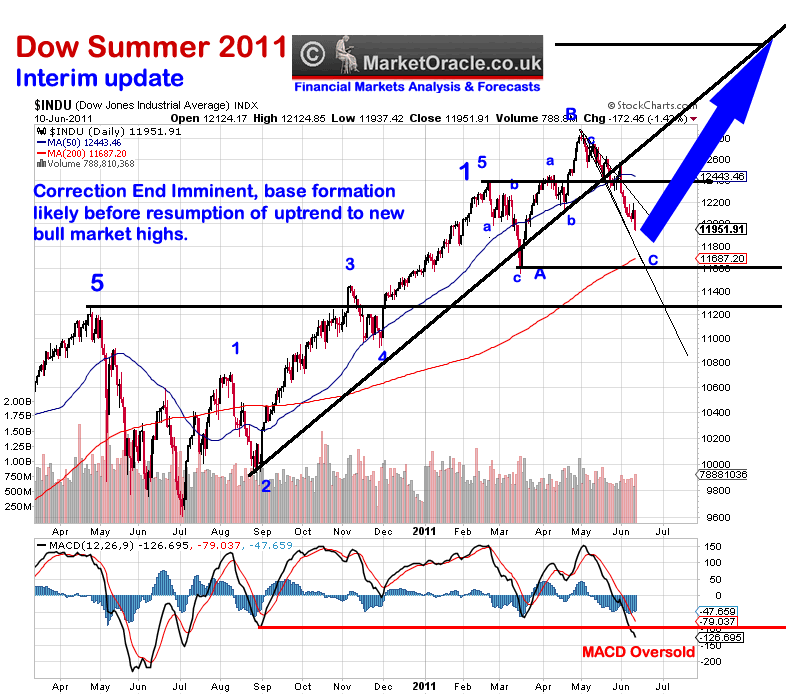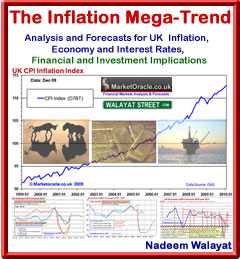Bankrupt Greece Blackmails Europe, Bailout or Euro Zone Dies
News_Letter / Global Debt Crisis Jul 25, 2011 - 01:14 AM GMTBy: NewsLetter
 The Market Oracle Newsletter
The Market Oracle Newsletter
June 29th, 2011 Issue #13 Vol. 5
Bankrupt Greece Blackmails Europe, Bailout or Euro Zone DiesStocks Stealth Bull Market 2011 Ebook Direct Download Link (PDF 2.8m/b) Interest Rate Mega-Trend Ebook Direct Download Link (PDF 2.3m/b) Inflation Mega-Trend Ebook Direct Download Link (PDF 3.2m/b) Dear Reader The Greek population is in constant revolt with another 48 hour national strike underway against ever expanding announcements of economic austerity though to date little of which has actually been implemented and therefore risks at the very a least a delay of the latest tranche of Euro 12 billion in what has now become a permanent flow of funds from core Euro-zone to Greece and other peripheral eurozone countries, therefore tax payers of core Europe and to a lesser degree Britain are being taxed to pay for the unwillingness of the PIIGS to pay their bills. Core Euro-zone countries are effectively being black mailed by Greece to finance Greece's public budget deficit and the interest payments due on the ever expanding debt mountain, none of which that the Greece population are having to bare the consequences of, for were they then Greece would have gone bust Iceland style a year ago. The facts are that IF Greece were not being financed as a consequence of being within the Euro-zone then all of the middle class of Greece would have already been swiftly wiped out, as the value of earnings, savings and assets would have collapsed along with the Greek economy as a consequence of the markets immediate adjustment to the true level of debt and inability to ever repay. Some argue that a short- sharp shock Iceland style would prove better in the longer run but there would be blood in the streets perhaps even revolution that would be infinitely worse for the Greek population than what is taking place today as international trade would literally seize up overnight due to the inability to make payments on goods and services and if a country can no longer import foods, then all that would be left would be food aid being shipped in Africa style to prevent starvation. Therefore the Greeks life style is being subsidised by hard working tax payers elsewhere, and those demonstrating on the streets of Greece are mostly delusional or represent subversive interests such as the communist party that are banking on profiting from debt crisis chaos, for if Greeks actually got what they are asking for i.e. an exit from the Euro and debt default, then the Greek population would soon, perhaps within 24 hours come to regret the outcome as all roads would lead to instant bankruptcy with all of its consequences. So all this talk of the Greeks wanting to leave the Euro-zone is a load of nonsense, for what the Greeks really need to worry about is Greece being kicked out of the Euro as it continues to act as a funding black hole that is currently costing core euro-zone tax payers Euro 100 billion per year that they will never get back. If Greece were ejected from the Euro-zone then there would soon be an exodus of Greece's best and brightest workers as they sought earnings in hard currency such as the Euro rather than be paid in worthless Zimabwe-esk Drachma's. Something that the Euro-zone politicians may be considering behind close doors in a desperate attempt to save the Euro currency from collapse. The Greek Trojan Horse Full of Debt
By perpetuating state sponsored fraud as the country proceeded to hide the true extent of public spending, debt and liabilities from the markets and European Central Bank as there was no longer a currency market that would reflect the real state of the economy which allowed Greece to secure funding for the state and its private sector at low interest rates that did not reflect the actual risk of default and debt burden. The Greek government were not doing anything different than what most of the higher paid working population engages in, where fraud is endemic, be it government economic statistics or the 60% or so of of tax payers that evade the majority of taxes resulting in highly paid doctors paying taxes that can be less than typical public sector nurses. Off course the Greek population can argue that most of the blame lies with their bankers, which is true, because the bailout is for holders of Greek debt which is mostly held by european bankster's. But the same holds true for every other country that has seen its politicians dump all of banking sectors losses and liabilities onto the backs of tax payers that has put every western country onto the path towards bankruptcy. But the Greeks by virtue of euro-zone membership have decided not to bare the responsibilities for their debt (public and bankster's) but for tax payers of other nations to take on both the liabilities of their banks and the Greek state, else the Euro dies. Therefore Greece is effectively black mailing core euro-zone nations into making funding available whether or not they actually implement any of the economic austerity plans as Greek politicians are likely to succumb to the greater weight of voters than follow through on demands from core euro-zone financing countries, after all what does most of the Greece population care, their money is safe against hyper-inflation, whilst they continue to evade taxes and the state runs a large budget deficit, instead letting the tax paying suckers of mainly Germany and France pick up the bill. Which means the tax payers of Germany and France are effectively trapped into a lose, lose situation, where the only solution is for either collapse of the euro currency (savers wiped out) or for total political, economic and monetary union which means permanent financing of states such as Greece by means of internal transfer payments as occurs in nation states where wealthier areas are taxed to subsidise the poorer areas (UK example - London / South East subsidises most of the rest of the country). Risks of PIIGS Sovereign Debt Default Joining Greece are the other european bankrupting nations to varying degrees that are collectively referred to as the PIIGS (Portugal, Ireland, Italy, Greece and Spain), though a few others such as Belgium should also be included in the list as the risks of actual default vary between nations of the Eurozone as the below graphic illustrates the probability of actual default within the next 3 years, though this does not mean that we will have to wait for 3 years for countries such as Greece that are permanently tottering on the brink of default.
Britain and other european nations outside of the Euro-zone whilst having the ability to print money and inflate their debt away at a steady pace are still at a risk of bankruptcy and actual debt default if they could no longer service their external debts i.e. that which is denominated in a foreign currency courtesy of their bankster's, which therefore puts Britains risk of default at somewhere between Germany's 13% and France's 25%. Sovereign Debt Default Contagion Risk To illustrate how severe the current crisis is, Greece's debt is now rated at worse than that of Pakistan, though Pakistan's debt never threatened a collapse of the global financial system. Greek government 1 year debt is yielding 20% and 2 year at 30%, that is a sign of markets discounting default i.e. the bond markets are pricing in a Greek debt default which is hitting the Greek banks hard and risks wiping them out and acting as a contagion to other european banks. All that the European Union has done is to throw good money after bad by wasting 100 billion euros and pushing Greek debt up from 260 billion euros to 330 billion euros, as if a greater debt burden would somehow prevent bankruptcy which I warned over a year ago was inevitable and the solution to the crisis remains the same for the Euro to effectively split into two. 11 May 2010 - E.U. $1 Trillion Bailout, Detonates Nuclear Option of Printing Money to Monetize PIGS Debt). Financing albeit shrinking annual PIGS deficits over the next few years will still mean that ALL of these countries debt burdens will be HIGHER in 3 years time, i.e. Greece's debt burden is expected to rise from 120% of GDP to as high as 150% of GDP. How is that a solution for the debt crisis? How will that prevent eventual debt default ? Answer - It won't! The ONLY solution is for the Eurozone economies to GET their economic houses in order which means cut the deficits and total debt as a % of GDP which can only be achieved through economic growth which means public sector spending cuts and reform of economies to generate economic growth that means LESS E.U. and national regulation as touched up on in the article Solving Britain's Economic Crisis Through Micro Business Capital Investments and Credit (31st Mar 2010). However when a country has a debt burden of 120%+ of GDP at interest rates of 5% or higher the inevitable result is still debt default. EURO II ? This, first of a series of money printing debt monetization bailouts puts the Euro firmly on a trend towards high inflation as are all fiat currencies, i.e. the fundamentals of the Euro block composed of many small weak economies that cannot devalue internally against highly competitive strong economies will still remain. The only possible solution is for a Euro II, i.e. split the Euro into two currency blocks one for the weak that suffer higher inflation and interest rates and the more competitive countries as part of the Euro II block (could just be Germany on its own?) which would act as a safety valve in times of economic crisis that demands internal currency devaluations. The mainstream press predominantly focuses on the bottom line numbers of by how much are each countries banks exposed to Greek government debt, without fully understanding the total exposure is about 100 times greater as a function of the $600trillion+ derivatives market that gambling prone British banks are more exposed to in terms of per capita then virtually any other nation on the planet. Forget the official UK statistics of £1 trillion of public sector debt, total actual debt and liabilities are in excess of £11 trillion and the fools in Coalition Government are now contemplating Britain borrowing money in the name of UK tax payers to throw into the Greek black hole! For instance the mainstream broadcast press smugly declares that British banks exposure the Greek government debt is just £2.5 billion. However throw in the derivatives exposure that also includes Portugal and Ireland and then the figure jumps to at least £350 billion with a figure approaching £800 billion or about 60% of GDP as the default contagion would not stop with Portugal as soon Spain and Italy would also follow their PIIGS brethren over the cliff, which would be enough to trigger a collapse of the global banking system as the earlier article ( Nov 2010 - Global Sovereign Debt Default Bankruptcy Bailout and Contagion Risk Analysis) illustrated the risk each country on its own posed to the global financial system if one were to default on their debts.
The November 2010 analysis treated Greece and Ireland as being on life support pending inevitable bankruptcy with Portugal not far behind that combined present a contagion risk factor to the global financial system of about 22%, an eventuality that the worlds financial system could survive, if only it could be halted to the peripheral euro-zone which it would not as soon Spain and Italy would join the collapse as their bonds are dumped sending interest rates soaring towards where Greece debt currently trades, which would be more than enough to bring about a collapse of the Euro-zone and within hours of which a collapse of the whole global financial system including that of the United States as all fiat currency is dumped for hard assets i.e. an hyperinflationary collapse event and NOT Deflation as the ivory tower academics that populate the mainstream press would lead you to believe (see Inflation Mega-trend Ebook FREE DOWNLOAD). Inflation is the ONLY Solution to the Debt Crisis and Next Phase of the Mega-Trend The Inflation Mega-Trend ebook of January 2010, concluded that the ONLY solution to the unfolding global debt crisis was for governments to print money and inflate their way out of debt . What we have seen over the past 2 years is just the first phase of the Inflation Mega-trend in the inflating of asset and commodity prices. Phase 3 of the Inflation Mega-trend (Phase 2 consumer prices) will be governments INFLATING WAGES, which is completely contrary to everything you hear in the central bank propaganda pumping mainstream press, the next phase of the Inflation Mega-Trend will be for central banks to inflate the wage price spiral, which will result in an acceleration of inflation. Whilst many may argue that many aspects of UK public debt are linked to inflation such as benefits and state wages and pensions, and not forgetting that some 25% of gilts are indexed. Lets leave aside for the moment that real inflation is a good 2 to 3% above the official inflation indices for Britain and most western economies, if not higher. What people tend to forget that PRIVATE debt is at many multiples of public debt, therefore governments in acting to boost the economy in nominal terms by reducing the debt burden on the private sector that is in a far indebted state i.e. bringing total debt and liabilities to about £11 trillion (more than X10 official public debt statistics), then the indexation argument goes out of the window. This has major ramifications for depositors who are already subsidising the debtors (both public and private) each year to the tune of at least 3% on CPI (after tax). Why can't those who STILL pump out deflation nonsense realise this inflation wage price spiral reality? Again. I need to reiterate that the rise in asset and commodity prices over the past 2 years is to all intents and purposes just Phase 1, Phase 2 is consumer prices (well underway in the UK), Phase 3 is wages and then off go down the road of the feed back loop the end result will that bond holders and savers will be wiped out, along with the debt. What this means for Greece ? Greece cannot inflate so they have no choice but to leave the Euro to enable them to inflate EVERYTHING , i.e. prices, and wages, that is the only way they will be able to STEAL from all of the bond holders and savers as they STEALTH default on their debt by means of high inflation which is the path that the UK and US are upon for a decade long inflation mega-trend. The ONLY reason why they are being prevented from defaulting and leaving the euro-zone is because banks of other european countries are not strong enough to withstand such an event. What a Greek Debt Default Will Mean for the UK Economy? There is no firewall between Britain and Europe if Eurozone banks start to go bankrupt then so will most of Britain's banks, the only protection savers will have is to protect their deposits by abiding by the compensation limits. Where the economy is concerned the government via its central bank (BoE) will print money to inflate the economy to prevent recession, hence the most probable outcome is continuing stagflation of high inflation and very low economic growth, as governments such as the UK aim to buy time. Credit Crisis Phase 3 Conclusion The credit crisis that began in August 2007 when the credit markets froze is not over, far from it, the Lehman's bankruptcy was just phase 2 of the credit crisis where increasingly over the past 18 months we have seen Phase 3 manifest itself in the bankruptcy of whole countries with Greece, Portugal and Ireland to all intents and purposes bankrupt, only being kept afloat to prevent bankruptcy of the banking system and the larger Eurozone countries namely, Spain, Italy, then France and Germany itself. The time horizon for the manifestation of the inevitable debt defaults can only be guessed as it depends on how much tax payers money will be thrown at the bankrupt states before the sovereign debt default contagion spreads from country to country. Readers should be under no illusion that bankruptcy of whole countries is inevitable, where even if countries such as Britain, Germany, France and the United States do not default on their debts, there will be a very heavy price paid in loss of purchasing power of earnings and savings as covered at length in the January 2010 Inflation Mega-Trend Ebook. However depositors need to immediately focus themselves on protecting themselves against nominal loss of deposits as would occur when states go bankrupt and bank deposits are only honoured upto the compensation limits. Once you have achieved this first emergency step of protecting your wealth in nominal terms then you can purse the second strategy of protecting your wealth in real terms which I have covered at length in 3 ebook's and ongoing newsletters (ALWAYS FREE), and continue to do so on an ongoing basis in articles that can be quickly viewed at walayatstreet.com Off course there are also major implications in the costs of compensating depositors, which as we have seen will ultimately fall onto the back of tax payers at the rate of approx £85 billion for every 1 million customers across each banking group, a potentially huge bailout cost that could literally doubles Britians public debt virtually over night. So the governments response would be similar to 2008, which would be to inject capital into the bankrupting UK banks the cost of which would be 1/10th that of making good on depositor guarantees but this would be likely restricted to fully UK banks rather than the likes of Santander. The risk that European Union is trying to balance is that of systemic risks of a disorderly Default of Greece and resulting collapse of the global financial system, with first in line being the PIIG's then the larger euro-zone countries such as France and Italy and then countries such as the UK and ultimately the United States will be hit all with-in accelerating trend with little time for professionals let alone ordinary people to react. Therefore readers should not be under any illusion that the debt default would be halted with Greece, because once it starts it would soon spread to the other PIIGS within a matter of weeks if not days, Portugal would go next, then Ireland and then Spain, with other debt dominos soon falling such as Belgium. This would bankrupt virtually every European bank whether or not they are exposed to PIIGS debt due to counter party risks, though unfortunately at this point in time the coffers of countries such as Britain, France and Germany are empty after a series of bailouts and huge public sector deficit spending programme's will mean they will not be in any shape to 100% guarantee bank issued debt or even retail deposits, instead savers are running a serious risk of actual loss of nominal value of their savings on funds deposited in excess of the £85k limit across banking groups. European Bank Run Contagion Risk The Greeks have already set the ball rolling by withdrawing their funds out of their banks during May and June as a consequence of their exposure to Greek Government debt, soon to be followed by Banks across Europe if not already in the process of desperately attempting to pull their funds out of Greek banks ahead of an inevitable debt default, and then from other PIIGS banks and financials, that's banks of Portugal, Ireland, Italy, and Spain as well as Greece on rising default contagion risks. The problem with the banking sector lies in the hidden exposure to the over the counter derivatives market that won't become apparent until there is an actual credit event such as Greece defaulting its debts, triggering claims on credit default swaps issued by banks and insurance companies as occurred following Lehman's bankruptcy in 2008 which brought down the worlds largest insurer AIG. Therefore Greece defaulting could quite easily collapse the whole banking system given that derivatives exposure could result in a crisis that is a100 times larger than the nominal value of the amount of debt defaulted upon.
One can measure the rising contagion risks in the credit default swaps market, where the price of insuring against Santander bonds against default has been steadily on a rise since March 2011. This increasing risk is also manifesting itself in the yield of Spanish government debt that has hit an 11 year high of 5.75% on 10 year bonds, which stands nearly 3% above German Bund's, a financing level that is not sustainable for Spain, let alone a further surge in yields that would follow a Greek debt default. The rise of euro-zone default risks, risks another credit markets freeze as the banks of countries such as Britain that do not face default by virtue of its ability to print money and inflate, increasingly pull the plug on financing of euro-zone banks much as occurred following the freezing of the credit markets in August 2007. Similarly UK retail customers would also be wise to limit exposure to euro-zone banks, especially of peripheral nations (PIIGS). Breaking Up the PIIGS Banks It is my opinion that at some point in time (if the banking system survives the current crisis) the British Government will force PIIGS banks such as Santander to sell off their British banking arms so as to ensure contagion risks to Britain's banking system are reduced, that is really the only solution to prevent a run on the UK banking system as occurred in September 2007 with Northern Rock and threatened to occur in Sept 2008. A break-up of the banks in itself would trigger a major credit market event, therefore it is probably going to take place in secret behind closed doors to prevent financial panic, i.e. British banking arms will be floated under the pretense of raising capital, which on balance would be seen as a market calming measure. UK Safe Retail Banks List The following table lists Britain's major retail banking groups (separate licences) in terms of the percentage probability that your deposits above the UK compensation limit of £85k and Euro-zone banks 100,000 (current £/E £86k) would be secure in the event of a series of euro-zone debt defaults starting with Greece and that the crisis is contained to these smaller peripheral euro-zone countries i.e. Greece, Portugal and Ireland, if Spain comes under real risk of default then that would require a revaluation of this list as banks such as Santander would come under far greater pressure given exposure to Spanish government debt.
There are other smaller safe banks such a Yorkshire Bank which is owned by the National Australia Bank Group. Depositors Protect Yourselves From Potential Banking Crisis UK bank depositors need to prepare for what will probably follow the Greece debt default contagion snowballing across Europe's financial system, especially as you are receiving a pittance in interest on even the best deposit accounts of less than 2.5% after tax which does not match the risks of loss of funds in excess of £85k. UK bank account holders have been receiving mail shots from their banks over the past 6 months informing them of the protection of their deposits upto a value of £85,000 per individual customers across the banking group. This should not be treated as junk mail but rather banks laying the ground work for the real risk of defaulting on deposits over compensation limits as a consequence of the bankruptcy of peripheral Euro-zone countries starting with Greece. Remember Greece going bankrupt is not a question of IF but rather when. Therefore savers with amounts deposited above the guaranteed limit need to ensure that they have measures in place well ahead of a banking crisis to ensure that they survive one both in terms of the ability to transact business as well as ensuring total funds exposed are LESS than the £85k banking limits at the time of a bank run. Scare Mongering ? Am I scare mongering? Try asking those that were locked out of their savings accounts when the Icelandic banks went bust during October 2008. The banks froze UK customers out of their accounts on the 7th of October 2008. My analysis of 2nd October 2008 had warned that small countries such as Iceland were at risk of going bankrupt, with Iceland's bankruptcy preceded by some 24 hours earlier by Iceland Going Bankrupt?, - "savers should at the first opportunity seek to repatriate their savings to a 100% UK bank as the consequences of a country going bankrupt could render guarantees meaningless".
Steps You Need to Take Now ! The situation is literally critical with a possible default imminent and bank runs probable even if Greece is bailed out again as a consequence of future inevitable default due to the ramping up of Debt burden (Debt/GDP). 1. Ensure that you have at least 2 current accounts across banking groups and at least one with a safe bank such as HSBC. 2. Next make a list of all of your deposit / bank accounts, with the amounts on deposit. 3. Now group your accounts by banking sector group (see list at end of this article as a guide). 4. If you are anywhere near the £85k limit with any banking group then move those excess funds immediately! 5. Consider transferring funds to your spouse so as utilise their compensation limit across a banking group. 6. Ensure you have procedures in place so that you can at short notice transfer funds from high risk banks to lower risk banks so as to limit the fallout from any banking system crisis. For instance open an NS&I Direct Saver account NOW (pays 1.75% gross), then use this during an unfolding sovereign debt crisis event to transfer your cash to as this is the safest deposit account available for UK depositors (Max £2mill, Min £1). Again do this now as you may not be able to do so during a debt crisis event due to high demand for the account. Instant Access Savings Accounts with Lower Risk banks
Higher Risk banks
All accounts pay significantly less than current CPI Inflation of 4.5%. 7. Do not have ANY savings are fixed deposit exposure to banks that do not fall under the UK Financials Services Compensation Scheme. 8. Limit exposure to PIIGS banks, that is Greece, Ireland, Spain, Portugal and Italy as these are at the most risk of going bust thus triggering a lengthy process for savers having to wait for compensation. Remember that if Spain comes under pressure following perhaps Ireland and Portugal joining Greece, then the risks posed to Santander depositors will also significantly rise. 9. Keep enough in cash to cover at least 1 months expenditure, (I keep 2 months worth of cash). Savers Paying For Low Risk Savers preparing to cut their risk by switching banks will be disappointed to learn that the safest banks also pay the worst interest rates on deposits, typically less than 2% gross and often below 0.5% on instant access accounts, similarly the highest risk banks pay the best rates (typically 3%), which is further evidence of a market that is geared towards the risk of default and therefore higher risk banks are more desperate to attract retail deposits. Britain's Slow Stealth Debt Default Off course the system is designed so that you can never win, to keep up with inflation and tax you will need to be in receipt of interest of at least 5.4%. Instead the banks are offering you a pittance WITH the risk of default, so frankly your being treated like fools, suckers by the banks and government as you finance bank losses, liabilities and government deficit spending. The fact is that Britain is BANKRUPT, it can never repay its current debt in real terms or cover future liabilities with future economic output, its just that we don't know it, this bankruptcy is manifesting itself in HIGH inflation that is the process for transfer of wealth from workers and savers as the price for stealth bankruptcy . It's the reason why your savings buy less than a year ago and the reason why your pay buys less than a year ago despite going up a few percent. There is only one way to escape from this decade long losing streak and that is to realise that approx 50% of the value of your savings will be wiped out over the next 10 years, so it is not the case that your savings are protected but rather they are guaranteed to lose approx 50% of their current value, so you have to learn to take risks with your capital, in which respect the Inflation Mega-trend Ebook (FREE DOWNLOAD) as well as the more recent ebook's, contain strategies for protecting and growing your wealth in REAL TERMS. Capital Safety in Index Linked Savings Certificates One low maintenance high safety cash investment product that comes to mind is the NS&I index linked certificate, which has recently been re-introduced after being suspended due to high demand in June 2010. The returning product now pays 0.5% interest + annual change in the RPI index (currently 5.2%) TAX FREE for upto a total of £15k per issue per individual. In my opinion there is NOTHING on the market that can beat the NS&I in terms of return AND safety of capital, and even more so for higher rate tax payers. Again no matter what happens to the inflation rate, your capital is 100% secure in real terms, and at the minimum guaranteed a return of 0.5% per annum, so even if deflation took place you would still receive a positive return of 0.5%. The certificates can also be cashed in early (after 1 full year), with little loss of indexation+interest. However these certificates are not suitable if you may require your funds within a year as you will not receive any indexation for inflation. Banking Groups Note whilst banking groups may have multiple licences as a consequence of mergers and takeovers, however they also may be in the process of merging licences so for ultimate safety one should remain focused on banking groups. LLOYDS BANKING GROUP (2 licences)
SANTANDER GROUP
Nationwide Building Society
BARCLAYS GROUP
HSBC GROUP
ALLIED IRISH GROUP
CITI GROUP
CO-OPERATIVE GROUP
RBS Group
Additional comments
Banks not under the UK FSCS.
Don't delay! Act today to form and implement a quick personal savings protection contingency plan, otherwise you may wake up one day to find yourselves locked out of your funds Iceland style, or worse lose deposits over £85k across banking groups. Stock Market Trend The stock market continues to track the conclusion of my last analysis (13 Jun 2011 - Stocks Bear Market Rally is Over Mantra About to Get Busted Again?) for an imminent bottom to be followed by the stock market carving out a base into late June / Early July, so no new analysis is warranted at this point in time.
Yes there is a disconnect between the stock market and economic perceptions, but that is nearly ALWAYS the case, well at least 70% of the time, which is why price trumps economics and the mainstream noise. Though don't forget that investing in the stock market is at the best of times high risk, so it is never a case of treating stocks as an alternative to bank deposits even if the banks look set to default, as banks going bankrupt would also wipe out their respective stock prices. Source and Comments: http://www.marketoracle.co.uk/Article28957.html By Nadeem Walayat Copyright © 2005-2011 Marketoracle.co.uk (Market Oracle Ltd). All rights reserved. Nadeem Walayat has over 25 years experience of trading derivatives, portfolio management and analysing the financial markets, including one of few who both anticipated and Beat the 1987 Crash. Nadeem's forward looking analysis focuses on UK inflation, economy, interest rates and housing market. He is the author of three ebook's - The Inflation Mega-Trend; The Interest Rate Mega-Trend and The Stocks Stealth Bull Market Update 2011 that can be downloaded for Free. Nadeem is the Editor of The Market Oracle, a FREE Daily Financial Markets Analysis & Forecasting online publication that presents in-depth analysis from over 600 experienced analysts on a range of views of the probable direction of the financial markets, thus enabling our readers to arrive at an informed opinion on future market direction. http://www.marketoracle.co.uk Disclaimer: The above is a matter of opinion provided for general information purposes only and is not intended as investment advice. Information and analysis above are derived from sources and utilising methods believed to be reliable, but we cannot accept responsibility for any trading losses you may incur as a result of this analysis. Individuals should consult with their personal financial advisors before engaging in any trading activities.
You're receiving this Email because you've registered with our website. How to Subscribe Click here to register and get our FREE Newsletter To access the Newsletter archive this link Forward a Message to Someone [FORWARD] To update your preferences [PREFERENCES] How to Unsubscribe - [UNSUBSCRIBE]
The Market Oracle is a FREE Financial Markets Forecasting & Analysis Newsletter and online publication. |
||||||||||||||||||||||||||||||||||||||||||||||
© 2005-2022 http://www.MarketOracle.co.uk - The Market Oracle is a FREE Daily Financial Markets Analysis & Forecasting online publication.



 Greece landed its debt filled Trojan horse economy onto the shores of the euro-zone in 1999, following which as if by magic a high interest rate high risk economy immediately became a low interest rate low risk economy. How did Greece achieve this apparent miracle ?
Greece landed its debt filled Trojan horse economy onto the shores of the euro-zone in 1999, following which as if by magic a high interest rate high risk economy immediately became a low interest rate low risk economy. How did Greece achieve this apparent miracle ?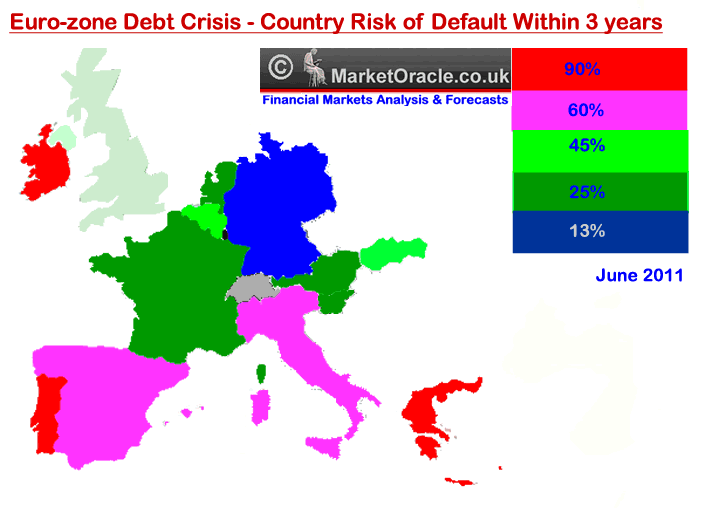
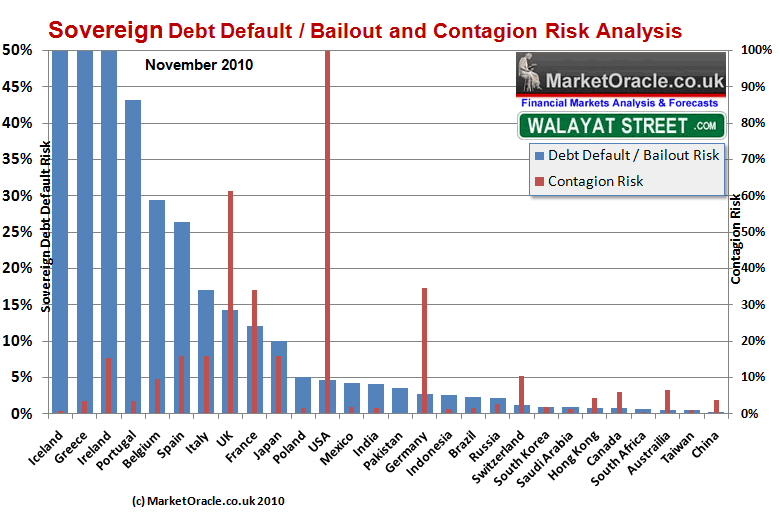
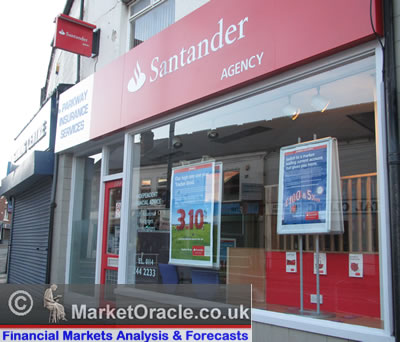 Over the past 3 years, Santander and other foreign banks have been allowed to run amok amidst Britain's retail banking sector as a consequence of an incompetent regulator and a desperate Labour government eager for anyone to take on the responsibility of restructuring a string of bankrupt UK banks which allowed Santander to gobble up a string of small to medium sized UK banks such as Bradford and Bingley, Abbey and Alliance and Leicester, which now pose a real risk to UK depositors as compensation licences have been consolidated therefore now instead of protection of 4X £85k, there is just 1X £85k across the banking group.
Over the past 3 years, Santander and other foreign banks have been allowed to run amok amidst Britain's retail banking sector as a consequence of an incompetent regulator and a desperate Labour government eager for anyone to take on the responsibility of restructuring a string of bankrupt UK banks which allowed Santander to gobble up a string of small to medium sized UK banks such as Bradford and Bingley, Abbey and Alliance and Leicester, which now pose a real risk to UK depositors as compensation licences have been consolidated therefore now instead of protection of 4X £85k, there is just 1X £85k across the banking group.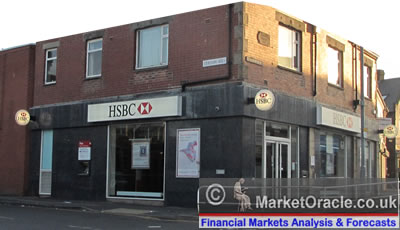 The government backed National Savings tops the list at virtually 100% depositor safety ranking, as if NS&I goes bust so will have the the whole British financial system. Readers may be surprised to find out that Britain's safest commercial retail bank is owned and operated by the supermarket Tesco, next to follow are HSBC and Co-op, with Spain's Santander offering a 50/50 bet on the safety of deposits over £85k. The rest offer an increasing probability of loss of deposits that would take place amidst a sovereign debt crisis induced banking crisis. The government owned Northern Rock is probably 99% safe at this point in time but it is being primed to be sold off as are the share holdings of other high risk major retail banks such as RBS and the Lloyds group.
The government backed National Savings tops the list at virtually 100% depositor safety ranking, as if NS&I goes bust so will have the the whole British financial system. Readers may be surprised to find out that Britain's safest commercial retail bank is owned and operated by the supermarket Tesco, next to follow are HSBC and Co-op, with Spain's Santander offering a 50/50 bet on the safety of deposits over £85k. The rest offer an increasing probability of loss of deposits that would take place amidst a sovereign debt crisis induced banking crisis. The government owned Northern Rock is probably 99% safe at this point in time but it is being primed to be sold off as are the share holdings of other high risk major retail banks such as RBS and the Lloyds group.
